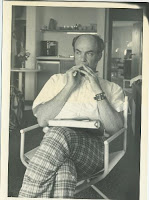 Back in grad school, my advisor and mentors gave so much and so generously that it sometimes felt like stealing. I stole from everybody at Wisconsin, but especially from the man in those badass plaid pants. So when I heard that Irv Piliavin died this week, my sadness for his loving family was mixed up with my gratitude for his inspiration.
Back in grad school, my advisor and mentors gave so much and so generously that it sometimes felt like stealing. I stole from everybody at Wisconsin, but especially from the man in those badass plaid pants. So when I heard that Irv Piliavin died this week, my sadness for his loving family was mixed up with my gratitude for his inspiration.
When faced with a risky research project or crazy new venture, I can sometimes steel my nerves by asking, “What Would Irv Do?” For academics who knew Irv, this is a terrifying question. Brilliant and mercurial, he was not one to play it safe. I’ll offer a few words about his work as evidence for his creativity and inspiration. Then I’ll share a more personal story.
Irv made research sound like a wild weekend in Vegas. He told ripping good stories about field experiments in Journal of Personality and Social Psychology, putting fake drunks on trains to study helping behavior. Irv rode with police and published an American Journal of Sociology article showing how “demeanor” swamps other factors in predicting arrest. He offered up a powerful control theory of delinquency in Social Problems, four years before Travis Hirschi’s Causes. Irv brought a strong test of rational choice and deterrence theories to American Sociological Review in 1986. And, when they said it couldn’t be done, he took to the streets and government centers to conduct systematic longitudinal research on careers in homelessness and foster care.
I’ve got a few Irv stories, both shareable and non-shareable, but I’ll just relate one that brought us together. One day in my first or second year of grad school, Irv noticed that I hadn’t slept much the night before. Somewhat reluctantly, because we didn’t know each other all that well, I told him about this recurring dream.
In the dream, I was drinking coffee at my kitchen table, feeling drugged or hungover and struggling to piece together the previous night. I’m looking down bleary-eyed at a newspaper and see this front-page story of a gruesome murder. As the letters and words start to come into focus, a realization builds and builds before lodging unshakeably in my mind: I was the killer.
Well, as soon as Irv heard the word “newspaper,” he recited the rest of my dream with perfect accuracy. I figured it must’ve been in a movie or Raymond Chandler story, but instead he says, “Maybe so, but I’ve had that dream since I was 17.” Irv figured we were guilty about unpunished crimes that blew up into murder in the dark of the night, though he covered his bases (You didn’t actually kill anyone, did you? Me neither). Then he said it took a little guilt to write good criminology — to cut through the layers of stigma and moral repugnance and get to the essence of the thing — and hinted that I might have a little potential along those lines.
So, I’ve got real gratitude for Irv and a real pang of sadness for his great love (and equally brilliant collaborator on those subway studies). But perhaps I’m repeating myself. Here’s what I wrote in 1995:
To the extent that I’ve stolen from others, I’ve probably stolen more ideas from Irv than from anyone else. As I leave Wisconsin, I only wish I had committed more of them to paper.

Comments